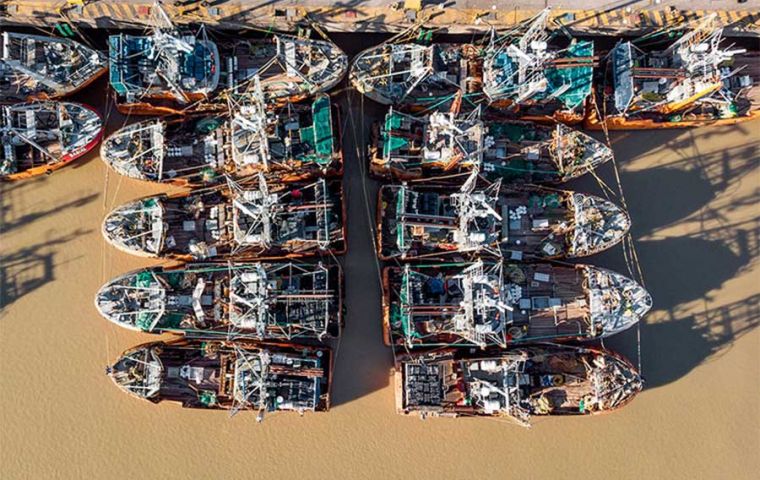MercoPress. South Atlantic News Agency
Argentine shrimp catch going through severe crisis
 The crisis has led to economic damage in ports like Mar del Plata and Puerto Madryn
The crisis has led to economic damage in ports like Mar del Plata and Puerto Madryn A severe crisis in Argentina's shrimp fishing industry, described as the worst in its history, has left 113 freezer vessels idle, 5,000 workers unemployed, and caused over US$200 million in export losses. The conflict stems from a dispute between fishing companies and unions (SOMU and Simape) over adjusting the Collective Labor Agreement, which ties workers' production bonuses to a 2005 shrimp price of US$12 per kilo.
Companies seek to lower this to the current market price of US$5.5 per kilo, as international shrimp prices have fallen, making the agreement unsustainable. A partial agreement with fishing captains was reached, but unions representing sailors remain inflexible, rejecting adjustments.
This has led to economic damage in ports like Mar del Plata and Puerto Madryn, with workers earning only a basic wage of AR$500,000 (US$420) monthly instead of a potential AR$10 million (US$8,300) with bonuses, which are part of the ongoing labor negotiations.
The SOMU demands government intervention, including tax exemptions, but refuses to revise the agreement, escalating tensions and risking further unrest.
The agreement with the fishing captains “was the result of rigorous bilateral work, based on a detailed analysis of production costs and the economic situation facing the frozen shrimp industry,” explained Agustín De La Fuente, president of the Argentine-Patagonian Chamber of the Fishing Industry (Capip), one of the three business chambers involved in the conflict.
“We are now confident that the seafarers will adopt a similar stance, where reasonableness and dialogue prevail in order to find a comprehensive solution to this conflict that affects more than 5,000 families,” added Eduardo Boiero, president of the Argentine Chamber of Fishing Vessel Owners and Freezers (CAPECA). The business side also includes CEPA (Chamber of Argentine Fishing Companies).
The fishing sector also includes the seafarers, represented by SOMU (United Maritime Workers' Union, whose general secretary, Raúl Durdos, has ties to the Moyano family), and Simape (Maritime Fishermen's Union, which brings together the seafarers of Mar del Plata).
The agreement with the Captains would include using the export price of shrimp reported by Customs for production awards, provided that it does so in a “dynamic” manner and accurately reflects market conditions.
In addition, SOMU submitted a petition to President Javier Milei, criticizing Decree 340 on the deregulation of the merchant marine, it denounced the paralysis of the tangonera fleet (the name given to vessels specializing in shrimp fishing), claiming that the readjustment proposed by the chambers “has no legal or economic basis” because “there are no fishing companies in bankruptcy.”
To settle differences, the union wants the government to reduce the Single Extraction Fee (DUE) and export taxes on fishing exports, temporarily exempt companies from fuel taxes (the second largest operating cost, behind labor), and establish an exception regime for social security contributions. But there is no mention of revising the Agreement. (Source: Infobae)




Top Comments
Disclaimer & comment rulesCommenting for this story is now closed.
If you have a Facebook account, become a fan and comment on our Facebook Page!